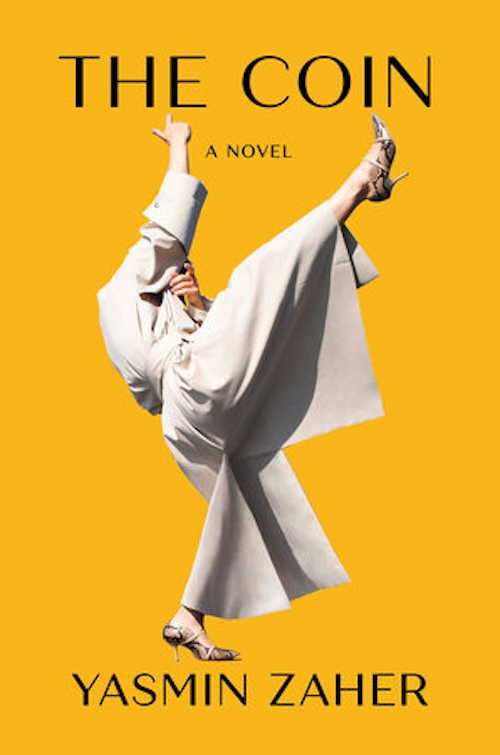(The Conversation) – Daniel G. Williams, Swansea University
(The Conversation) – Yasmin Zaher’s remarkable novel The Coin has won the Swansea University Dylan Thomas Prize for writers under the age of 40.
This is not a story that begins at the beginning. Instead, its narrator starts with dirt and an obsession with cleanliness, but suggests later that the coin of the title – an Israeli shekel that she accidentally swallowed on a family road trip in which her parents were killed in a car crash – would have been an equally appropriate place to begin.
Long forgotten, the swallowed coin begins to make its presence felt, somewhere in her body, following her move to America. The narrator is a wealthy young Palestinian woman, teaching boys at a New York City middle school. Her wealth, however, is in the hands of a brother who controls her allowance. She responds by developing a scheme to resell luxury handbags with a homeless con-artist, known throughout as “Trenchcoat”.
This is one of several attempts at shaping the world around her: she revels in her sexuality and ability to redefine herself through fashionable clothes and accessories; she teaches her class about black power and takes them on a trip to listen to the “dagger poems” of a black nationalist poet in New Jersey.
I assume this poet is Amiri Baraka since they eat “Black Dada Nihilismus” burgers, a reference to his poem of the same name. But such acts of resistance, if not futile, are limited. Like the swallowed coin, the levers of control, whether material or psychic, lie out of reach as we witness the narrator’s gradual unravelling.
It is perhaps appropriate that a novel set in New York should win the prize named after Swansea’s most famous poet. New York both enticed and frightened Dylan Thomas. It was the city in which he died. The city, also, in which he recorded the ground-breaking reading of A Child’s Christmas in Wales.
In that story, as in his earlier Return Journey, his childhood self is a ghostly presence wandering among the “blitzed flat graves” of shops “marbled with snow and headstoned with fences”. The snow hides devastation. The destruction of the city that Thomas knew as a child. The 44 air raids mounted on Swansea between 1940 and 1943 killed 390 people. And it’s the similar loss of people and places, and the suffering in Gaza today, which Zaher’s novel examines.
Palestine is a persistent and troubling presence in the The Coin. For Dylan the devastation of Swansea was a metonym for a wider world where civilians were increasingly the victims of war. His world is, regrettably, still ours in that sense. The Coin is a profound meditation on our contemporary world and our complicity in the destruction of another place and people.
In a moving scene, the narrator recalls a Jewish friend, “a very gentle girl who dreamed of becoming a ballerina”. She lived in a house that once belonged to “a Palestinian family that had been expelled in 1948”. The friend tells her about two underground rooms in the garden. One of the rooms, “the poop room”, allows access to the second which contains “a big wooden chest full of treasures and gold”. The narrator keeps “thinking of that secret chamber off the shit room, the wooden chest inside, full of silverware and gold of the family who thought they would return.”
The swallowed coin. The inaccessible allowance. The wooden chest full of treasures and gold. Unreachable currency functions as a powerful symbolic centre connecting the brief scenes and meditations that constitute this appropriately fragmented novel. Lost somewhere in the narrator’s entrails, removed from economic exchange, the coin belongs with the excrement and detritus of urban life, which is the object of the narrator’s disgusted obsessions.
New York in this novel is a repository of failed circulation – the filth of the city’s streets offering a gothic underside to the endless flows of capitalism, frustrating the narrator’s obsessive attempts at keeping herself clean. Narratives and circulation end in the stasis of dirt. Palestinian history ends in dispossession. Swallowed coin, inaccessible allowance and a buried treasure chest are symbolic repositories of Palestinian traumatic memory.

Yasmin Zaher, The Coin: A Novel. Catapult Books. 2025. Click here to Buy.
Zaher shows us how the novel form can still offer a unique way of understanding the world, of mapping our contemporary disorientation. It does this not by offering clarity, but by lingering in the spaces where movement, value and meaning break down. This is a novel about circulation – of money, of bodies and of meaning.
The swallowed coin is itself a kind of resistance, a refusal to go along with the restless movement of capital that defines our world. The coin refuses liquidity and thereby refuses complicity; its removal from the economic system mimics a kind of muted protest. Beneath the novel’s often frenetic and energetic surface hides a resistant counter-politics of inaction.![]()
Daniel G. Williams, Professor of English Literature, Swansea University
This article is republished from The Conversation under a Creative Commons license. Read the original article.

 © 2026 All Rights Reserved
© 2026 All Rights Reserved